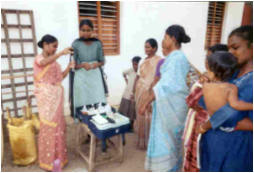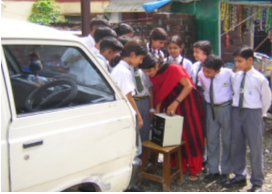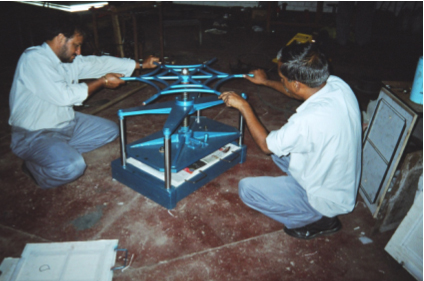| TARA Environmental Products - A CLEAN-India Perspective Meghna Das mdas@devalt.org C LEAN-India (Community Led Environment Action Network) is a nation-wide programme of environmental improvement, involving schools, communities, NGOs, Government and many other bodies. Its three pronged approach of environmental quality assessment, mass awareness and remedial action employs the use of tools and techniques that gives the stakeholders an opportunity of gaining hands-on experience and a means of implementing remedial action.TARA tools and products serve as the instruments for environmental improvement in the hands of CLEAN-India network partners comprising students, community groups, NGOs and various other institutes. Environmental Monitoring Tools Monitoring different environmental parameters gives a clear picture of the changing environmental quality of an area and helps in pinpointing the exact cause of pollution. This aids in decision-making to rectify the problems with the students and communities themselves at the fore, bringing in the change. This also serves as an effective tool in the hands of students and communities, helping them realize the importance of their own actions. Jal TARA Water Testing Kit This simple-yet-scientific field based water testing kit has reached out to not just
schools but also to various community groups in 29 cities of the country through the CLEAN-India network. Students and communities are trained in scientific skills for monitoring the drinking water quality that enables them to put into practice the theoretical aspects of chemistry learnt in the classroom in real life conditions. Apart from the 14 parameters that the kit can test, a key feature of the kit is the ability to test for bacterial contamination in drinking water samples even at the individual household level with the help of TARA Aqua Check Vials. A simple colour change in the vials indicates that the water is contaminated with bacteria found in sewage. Thus, this "mini-laboratory" makes it possible for people to find out instantly whether the water available to them is potable. Several water treatment actions have been taken on the basis of the validated water quality results obtained by the communities themselves. For examples, in one of the wells that the students of CLEAN-Sagar carried out water testing, coliform was found to be present. They informed the local authorities about the problem and got potassium permanganate, a disinfectant, sprayed in the well. Similarly, several such initiatives have been taken in the other parts of the country as well. Pawan TARA Air Testing Kit It is an easy to operate, portable, compact air quality monitoring kit designed such that concerned citizens, NGOs, students, industries and public authorities can actively participate in monitoring the air quality. The kit is equipped with reagents for semi-quantitative estimation of gaseous pollutants (SO2 and NOx) and quantitative estimation of Respirable Particulate Matter. This tool empowers the communities to learn more about the quality of the environment and use their findings to create or demand solutions. On the basis of the findings on air pollution, CLEAN-Indore has filed a Public Interest Litigation (PIL) in the MP High Court against polluting vehicles and the deteriorating air quality in the city. Environmental Improvement Action
Systematic assessment of the environment should ultimately lead to mobilization of communities to undertake environmental improvement actions at the local level. The purpose of assessing the state of the environment can be served only if it is followed up by action. Hence action oriented activities and tools are an integral part of any environmental reform. Jal TARA Slow Sand Filter On assessing the water quality, if water is found contaminated with coliform bacteria and turbidity, Jal TARA filter is installed in the problematic sites. Through the CLEAN-India network, schools in Delhi and Jhansi as well as in certain communities in Berinag, Uttaranchal have been successful in treating water to remove contaminants and acquire safe potable water. Jal TARA is a community level filter, which can provide 2000-3000 litres of safe water per day. The system is cost effective, simple to install, requires no power and needs less maintenance. The Jal TARA Filter is designed to treat drinking water contaminated with pathogenic bacteria and turbidity, using the slow sand filtration technique. TARA building materials Schools and concerned citizens have also initiated solid waste management in their respective schools and communities. Compost pits have been constructed in many places. One of the highlights has been the installation of a movable vermin composting tank in a CLEAN-Jhansi community. This tank structure is prepared with separate moulded cement walls of TARA Nirman Kendra that can be attached together with screws. This mobile structure could be placed anywhere with minimum effort. Another initiative has been the use of Micro Concrete Roofing (MCR) tiles in schools of CLEAN-Gwalior. These tiles employ the use of stone-crusher dust and are heat resistant and thus, environment-friendly. Environment Friendly Products Rang TARAng Natural Holi Colours Communities, through the CLEAN network, have been apprised of the harmful effects of toxic Holi colours sold in the market. They have been taught how to make natural and safe colours at home, using simple and easily available products like turmeric, henna, flowers, red sandalwood and other natural substances. Training on making eco-friendly Holi colours from local resources has also been imparted by Development Alternatives to members of women Self Help Groups (SHGs) in Niwari Block of Tikamgarh District (Madhya Pradesh). Around 2000 tribal women have been provided livelihoods through this activity, which has empowered them financially to initiate a sustainable micro-enterprise. The marketing of colours has been facilitated by TARA under the brand name Rang TARAng. CLEAN-India cities also promote the Rang TARAng colours by putting up stalls at major intersections and markets, conducting workshops at schools and in the community and have been quite successful in their endeavours. TARA recycled paper and paper products Under the CLEAN network, the promotion and use of recycled paper is propagated. This effort has been successful to a large extent, wherein schools and partner NGOs have extensively inculcated the use of these environment-friendly products. Hence, TARA tools and products have huge potential in bringing about environmental improvement through platforms like environmental campaigns such as CLEAN-India. q
|


 very simple. CLEAN-India Schools have taken it up as a part of their regular routine. Students, along with their teachers, are trained in terms of operating and maintaining the paper plant. Since the students themselves are involved in the recycling process, it helps them understand the various resources and efforts put in making paper.
very simple. CLEAN-India Schools have taken it up as a part of their regular routine. Students, along with their teachers, are trained in terms of operating and maintaining the paper plant. Since the students themselves are involved in the recycling process, it helps them understand the various resources and efforts put in making paper.  Newspaper into few definite shapes which are glued into a carry bags. The dies were developed in such a fashion which can cut newspapers into different shaped carry bags and file covers at the same time. The safety factors are also incorporated in the device.
Newspaper into few definite shapes which are glued into a carry bags. The dies were developed in such a fashion which can cut newspapers into different shaped carry bags and file covers at the same time. The safety factors are also incorporated in the device.